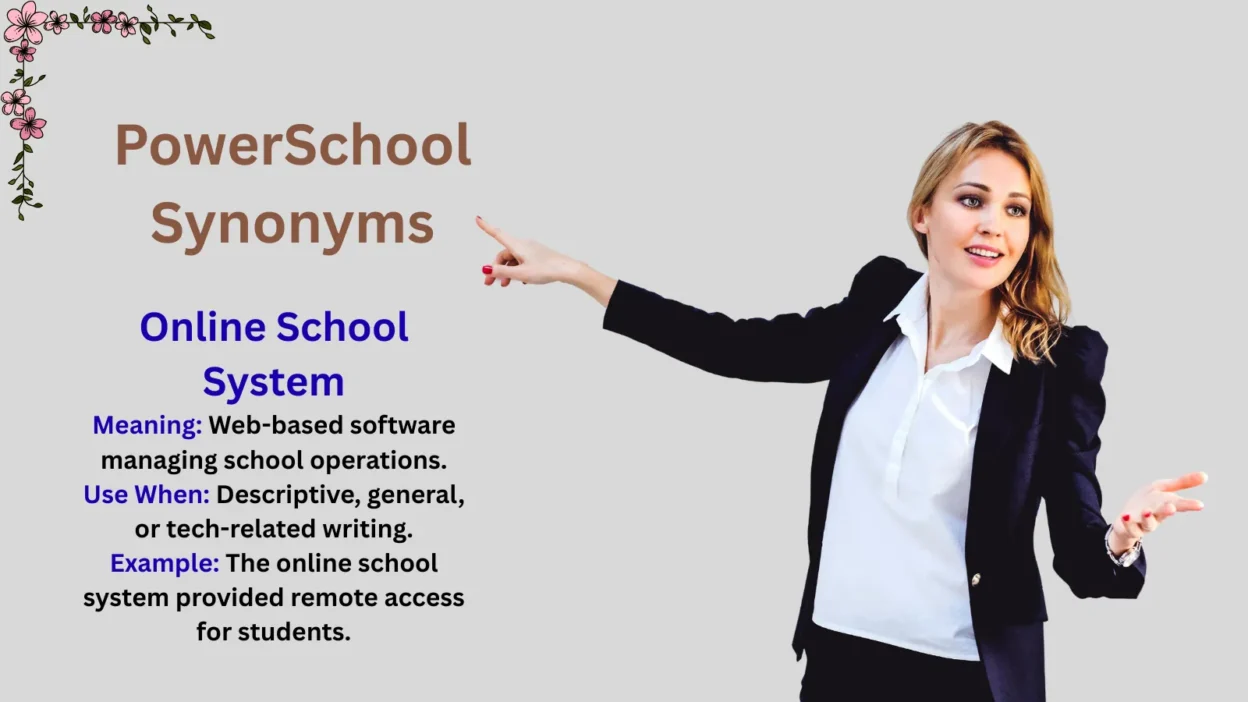Synonyms of PowerSchool, such as student information system, SIS, learning management system, and academic portal, describe platforms used to manage student data, grades, schedules, and school communications. For example, “SIS” emphasizes the technical system, while “academic portal” highlights the student access point. These words capture functionality, technology, and educational administration.
If you’re writing about education, school management, or academic technology, using the right synonym for PowerSchool helps convey clarity and specificity.
These synonyms allow educators, administrators, and writers to describe digital school systems or educational software effectively.
What Does PowerSchool Mean?
PowerSchool is a software platform used by schools to manage student information, grades, schedules, and communication. It can refer to:
- Literal meaning: The actual software product.
- Generalized meaning: Any student information or learning management system.
- Metaphorical meaning: Platforms that centralize school or educational management.
Think of PowerSchool as a central hub for school administration and student data tracking.
Synonyms for PowerSchool (With Meanings, Usage & Examples)
1. Student Information System (SIS)
Meaning: Software managing student data and academic records.
When to Use: Formal, educational, or technical writing.
Example: The SIS keeps track of student grades and attendance.
2. Academic Portal
Meaning: Online platform for students and teachers to access school resources.
When to Use: General, user-focused, or informational contexts.
Example: Students log in to the academic portal to view their assignments.
3. Learning Management System (LMS)
Meaning: Software for managing courses, lessons, and learning content.
When to Use: Educational technology or school administration.
Example: The LMS provides online lessons and quizzes for remote students.
4. Student Portal
Meaning: Interface where students access grades, schedules, and messages.
When to Use: Informal, descriptive, or practical contexts.
Example: Students checked their assignments through the student portal.
5. School Management System
Meaning: Platform for administrative and academic tasks in schools.
When to Use: Educational technology or administrative writing.
Example: The school management system streamlined attendance tracking.
6. Education Platform
Meaning: General term for software supporting learning and administration.
When to Use: Informal, general, or tech-oriented contexts.
Example: Teachers use the education platform to upload lesson materials.
7. Digital Classroom
Meaning: Online environment for managing classes and student interactions.
When to Use: Educational or remote learning contexts.
Example: The digital classroom allowed students to submit assignments online.
8. Gradebook System
Meaning: Software specifically tracking student grades and performance.
When to Use: Academic, teacher-focused writing.
Example: The gradebook system automatically calculated semester averages.
9. Online School System
Meaning: Web-based software managing school operations.
When to Use: Descriptive, general, or tech-related writing.
Example: The online school system provided remote access for students.
10. Enrollment System
Meaning: Manages student registration and class enrollment.
When to Use: Administrative or technical contexts.
Example: The enrollment system simplified course sign-ups for new students.
11. School Portal
Meaning: Centralized web platform for students, teachers, and administrators.
When to Use: General or descriptive writing.
Example: Parents monitored attendance via the school portal.
12. Educational Software
Meaning: Software designed for learning or administrative tasks.
When to Use: Technical, educational, or descriptive contexts.
Example: The educational software integrated grades, attendance, and schedules.
13. Student Management System
Meaning: Software for handling student records and progress.
When to Use: Formal, academic, or technical writing.
Example: The student management system improved record-keeping efficiency.
14. Virtual Classroom
Meaning: Online space for teaching and learning.
When to Use: Remote learning, educational technology.
Example: The virtual classroom allowed live lectures for distant students.
15. Academic Management System
Meaning: Platform for tracking school operations, grades, and schedules.
When to Use: Formal or technical writing.
Example: The academic management system streamlined teacher reporting.
16. eLearning Platform
Meaning: Software for delivering digital learning content.
When to Use: Online education or tech-focused writing.
Example: Students accessed modules on the eLearning platform daily.
17. School Information System
Meaning: Centralized system managing student data and communications.
When to Use: Formal, administrative, or technical contexts.
Example: The school information system ensured data accuracy across campuses.
18. Online Academic Portal
Meaning: Digital platform providing access to grades, lessons, and schedules.
When to Use: Informational or practical contexts.
Example: Students logged into the online academic portal to check assignments.
19. Campus Management System
Meaning: Software handling administrative tasks across a school or campus.
When to Use: Administrative or tech-focused writing.
Example: The campus management system organized staff and student workflows.
20. School Database
Meaning: Central repository for student records.
When to Use: Technical, administrative, or descriptive contexts.
Example: The school database stored attendance, grades, and personal information.
21. Attendance System
Meaning: Tracks student attendance and participation.
When to Use: Teacher or administrative contexts.
Example: The attendance system flagged students who missed classes frequently.
22. Report Card System
Meaning: Tracks grades and generates student report cards.
When to Use: Academic or administrative writing.
Example: Teachers printed grades using the report card system.
23. Parent Portal
Meaning: Interface for parents to monitor student progress.
When to Use: Informational, school communications, or practical writing.
Example: Parents checked homework assignments through the parent portal.
24. Teacher Dashboard
Meaning: Platform providing teachers with student data and analytics.
When to Use: Administrative or practical educational contexts.
Example: The teacher dashboard displayed class averages and attendance.
25. School Tech Platform
Meaning: Broad term for technology tools supporting school management.
When to Use: General, educational, or tech writing.
Example: The school tech platform integrated lessons, grading, and communication.
26. Student Data System
Meaning: Manages academic records and student information.
When to Use: Formal, administrative, or technical contexts.
Example: The student data system ensured accurate grades reporting.
27. Digital School Platform
Meaning: Online software for school operations and learning.
When to Use: Informational or educational writing.
Example: Teachers updated lessons through the digital school platform.
28. Learning Portal
Meaning: Online access point for courses and resources.
When to Use: Student-focused or educational contexts.
Example: The learning portal allowed students to submit assignments remotely.
29. Academic Hub
Meaning: Centralized digital platform for school activities and information.
When to Use: General, descriptive, or tech-related writing.
Example: The academic hub connected teachers, students, and parents seamlessly.
30. School LMS
Meaning: Learning Management System for school operations.
When to Use: Technical, administrative, or educational writing.
Example: The school LMS integrated online lessons and grading.
How to Choose the Right PowerSchool Synonyms
The right synonym depends on context, tone, and audience:
- Formal / Technical: SIS, LMS, student management system, academic management system
- Student / Parent Focused: Student portal, parent portal, online academic portal
- Administrative / School Operations: School management system, campus management system, school database
- Learning / Educational Use: Digital classroom, eLearning platform, learning portal
Conclusion :
The synonyms of PowerSchool allow writers to describe educational technology, student data management, and school administration clearly. Words like SIS, LMS, and school management system make administrative writing precise, while student portal, academic hub, and learning portal focus on access and user experience.
Using the right synonym helps your writing communicate clarity, relevance, and tone—whether describing a literal software system, online classroom, or educational management platform. Each term adds nuance to the concept of digital school management.



